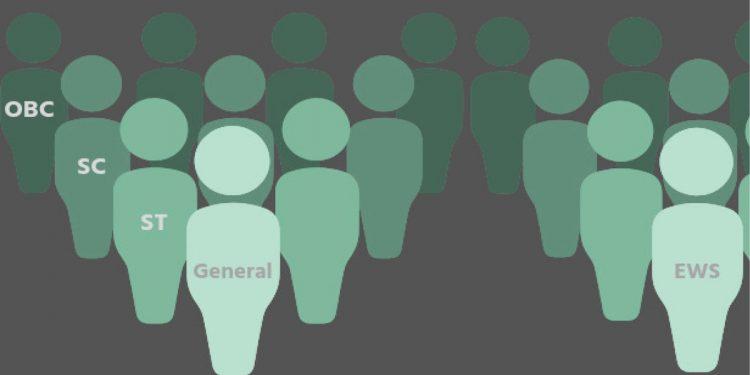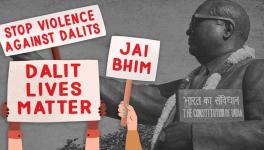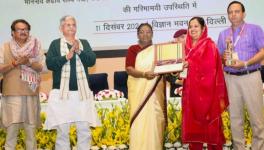Rethinking the Debate on Reservations

G. MOHAN GOPAL explains how the Constitution replaces the Brahmanic idea of merit with a modern, democratic, rational, scientific and constitutional idea of merit
—-
Reservations for Other Backward Classes (OBC), Scheduled Castes SC) and Scheduled Tribes (ST) are under unprecedented attack in India. The main anti-reservationist attack is that reservations kill merit.
The anti-reservationists are right. Reservations are indeed killing merit — the Brahmanic idea of merit. That is what it is supposed to do. The Constitution replaces the Brahmanic idea of merit with a modern, democratic, rational, scientific and constitutional idea of merit.
The Brahmanic idea of Merit
“Merit” literally means “state or fact of deserving well”. Merit has no standard content. Its benchmarks — “who deserves what” — are determined by the dominant values of society. Merit does not have static content.
The Brahminic idea is that merit is God-given, inherited and acquired exclusively through birth. Those who do not have it can never acquire it — such as women, avarnas and dogs.
The idea of “guna” is the basis of the Brahmanic idea of merit.
The renowned Monier-Monier Sanskrit Dictionary defines “guna” in this context as the “chief quality of all existing beings consisting of a mixture of sattva (goodness or virtue), rajas (passion or darkness) and tamas (foulness and ignorance).
The Bhagvad Gita declares that God divides humans into four “Varnas” (castes) on the basis of their merit — “gunas” — and “karma” (deeds) acquired in (unverifiable) previous births and places each human being in every birth in the appropriate Varna.
Status, power, wealth and opportunities are reserved for the four varnas, especially the first three, in descending order of abundance.
Individual merit — what each individual deserves — is determined by the Varna of his or her birth. Those without any merit whatsoever (90% of the people) are outside the pale of the Varna system and are considered sub-human or non-human. Their lot is to work for the Savarnas in any capacity that they are asked to. They are slaves. They are degraded souls without any merit — undeserving of anything but dehumanization, exclusion and penury. Obedience to the Varna system is their only path to salvation.
Shorn of its phantasmagoric superstitions, the Brahminic system of merit is simply a feudal system of inherited merit — a feudal system of reservation of opportunities, wealth and power for the children of the feudal elite intended to main a stagnant society that preserves the hegemony of caste elitism.
The real aim of the anti-reservationist movement is to restore this Brahminic idea of merit and Chaturvarna reservations. Their purpose is to protect and save elitism.
The Brahmanic Idea of Reservations
Brahmanism created and operated for centuries the longest running and most extensive system of reservations in world history.
The caste system is nothing but a massive system of reservations.
Every single occupation, job and profession was catalogued and reserved for specific social groups. Merit was inherited. Privileges were inherited. There was no need for any selection system to identify the meritorious. God took care of that. Merit was clear from the Varna and jaati of birth.
Each individual and each group was forced to do the same or similar jobs. This destroyed horizontal and vertical mobility and the ability to acquire new knowledge and skills. Slavery, indentured labour and forced labour (another Brahmanic scheme of reservations) thrived. Surplus value created by producers was expropriated. All value, profits, benefits and assets belonged to the Brahmanical castes. Education and learning were carefully controlled. God and religion were liberally harnessed to reinforce the system. It was a brutal and fascist system of reservations that exacted an incalculable human cost.
The Brahmanic idea of merit and the Brahmanic system of reservations are anti-social, anti-democratic, fascist, unacceptable and unimplementable in today’s world.
The Constitutional idea of Merit
The Constitutional idea of merit is derived from Constitutional values such as equality, liberty, fraternity, dignity, social justice, equity, due share and representation as well as the Constitutional ideologies of democracy, secularism and socialism.
The Constitutional world view is radically different from Brahmanism.
It is derived from our freedom movement and our indigenous dalit cultures. It recognizes an infinite variety of talent and intelligence (literally, the ability to see what is not obvious) in every sentient being — human and non-human — and attributes equal value to all qualities and capabilities. It is non-hierarchical.
The Constitutional idea of merit rejects the idea of disparities of merit, talent and intelligence between people. The Constitutional world view rejects the idea that possession of any particular set of qualities, attitudes, skills or knowledge (QASK) makes a human being wholly superior to another for all purposes and all contexts. Instead, it focuses on aptness of QASK with reference to specific tasks and roles. It focuses on excellence of tasks rather than on excellence of souls.
The constitutional idea is that merit is human made, acquired through life experience and effort. Merit is born in action and in effort. Mere humanity and existence of life creates its own merit for every human being. No one lacks merit. Merit is not inherited. It is not acquired or reduced by mere membership in a social group. As we cannot control the opportunities for action and effort available to us, all action and effort deserves equal recognition, value and equal reward. Every human being has the opportunity to build merit.
Society has an obligation to recognize and reward merit in a rational and scientific manner. The benchmarks of merit must be determined democratically, not by an elite
Merit in a Constitutional system of selection would for example focus on benchmarks based on Constitutional values such as: (i) the potential of the candidate to advance representation of social groups and the advancement of marginalized social groups and their members; (ii) life experience in facing and overcoming socially inflicted suffering, discrimination and oppression; (iii) contributions to the struggles for liberty, equality, dignity and fraternity and for the social transformation of the country; (iv) empathy and compassion with the powerless; (v) knowledge of the human condition of the masses and of solutions that would help common people to address the problems they face; (vi) commitment to Constitutional values especially of democracy and secularism; and (vii) interest in, and commitment to, the opportunity that is sought. Knowledge and skills related to work or study, such as domain-matter expertise and communication skills are “teachable” skills that can always be acquired as needed.
The Constitutional Idea of Reservations
Constitutional reservations are based on the Constitutional idea of merit — “who deserves what” is determined with reference to Constitutional values.
The first purpose of the Constitution — born in the middle of the blood bath of the partition — is to ensure that Indians should never slaughter each other ever again as they did in 1947.
The Constitution is based on the lesson of our history that civil war and invasion are inevitable when power is in the hands of elites.
To this end, a fundamental goal of the Constitution is the inclusion and representation of the voice of all segments of the people in affairs of the State, and their integration in five critical domains from which common people have been excluded for centuries — the legislature, the executive, the judiciary and education. This is essential for peace, harmony, social stability and for the survival of the Republic.
The Constitutional project of reservation seeks the restoration to backward classes of their due share of opportunities based on population share that had been stolen from them due to caste discrimination. It seeks the democratization of the State and of society. Reservation will also require disgorgement of undue share that was hoarded by oppressor castes.
It responds to the sentiments expressed by Mr. S. Nagappa, a Dalit member of the Constituent Assembly on 27th August 1947 who told the Assembly,
“I want my due share; though I am innocent, ignorant dumb, yet I want you to recognise my claim. Do not take advantage of my being dumb. Do not take advantage of my being innocent. I only want my due share and I do not want anything more. I do not want, like others, weightage or a separate state. Nobody has a better claim than us for a separate state. We are the aboriginals ‘of this country.”
The Constitutional system of reservations would be based on a clear recognition that reservations are a fundamental right triggered by group backwardness arising from discrimination and non-representation.
The Constitutional system of reservations would not be artificially restricted by limitations such as those imposed by the judiciary — the 50% ceiling, creamy lawyer exclusion and non-applicability to promotions (for OBCs). Reservations, including determination of the population share of social groups and would be based on data generated by community/caste census.
The Constitutional selection and reservation system must be open to all sections of society and should not favour the knowledge or culture of any group over another. As noted, the reservation system should use Constitutional values as the basis for constructing the benchmarks that would define merit.
Social considerations would be fully integrated into the selection process as they flesh out and thicken merit. They are not, and should not be misunderstood as, “non-merit” criteria.
There will be no sub-speciation into “superiors” and “inferiors” through standardized testing. Instead of standardised testing, Constitutional reservation would use decentralized and customized multi-point and multi-modal systems of selection tailored to the needs of the hiring/admitting institution.
Constitutional reservation would identify specific areas of study and work for which admissions and recruitment are to be undertaken and the qualities, attitudes, skills and knowledge (QASK) needed by institutions to enhance their excellence in each area. This would then be matched to the QASK of candidates while maintaining the objective of representation.
Exorcising Elitism from Reservations
The Constitution makers decided to leave to the political executive the task of devising the “special measures” to be taken to operationalize the Constitutional idea of merit and the Constitutional vision of reservations. Unfortunately, this decision has turned out to be a big mistake.
Instead of creating a new, democratic, rational system of selection in line with the Constitutional idea of merit and the Constitutional vision of reservations, the bureaucracy and judiciary preserved — and vastly expanded — the colonial era elitist system of selection through standardized testing based on examinations and interviews.
Standardized testing is a method of selection with an illicit purpose — to neutralize equality and legitimize inequality. A brief detour into the biography of testing is required to understand its true nature.
In “The Measure of Merit” (2007), an epic comparative study of merit in France and the United States (1750-1940), Prof. John Carson describes a dilemma faced by France and the United States, which, incidentally, India avoided in its Constitutional idea of merit and vision of reservations.
Prof. Carson writes, “[H]aving toppled aristocratically organized societies in the name of natural rights and the people’s sovereignty, what would be put in their place? How could a new elite be selected and justified within a political ideology also celebrating equality and human and universal rights? How in other words could inequality be rendered legitimate?”
Prof. Carson argues that “these two new democratic republics, dedicated to some version of equality turned to understandings of human nature to reinstitute inequality on a new, seemingly more “rational” footing”.
Prof. Carson says that both France and the United States “confronted the issue of difference, especially natural inequality” and “both in one way or another eventually turned to testing as a way of establishing merit, and in each the response was as much one of anxiety approbation. Some worried that the tests might be wrong: inaccurate, ill-conceived, and doomed to choose the wrong people based on the wrong criteria. Others, however, were unsettled by the opposite: that the tests might conceivably be right, and thus that some people really were naturally better than others. What if inequality was the product not of poor environment or personal choices but the luck of the genetic draw, and what if scientists could “see’ the difference?”
Testing fits neatly into the ideological world view of France and the United States. They are constitutionally committed to equal protection of the law and equality before the law. They are also committed to equality of opportunity. However, they are not constitutionally or politically committed to equality of outcomes as they are market economies that rely on inequality of outcomes as incentives for creation of wealth — France claims to be relatively more committed to equality of opportunity through maintaining a welfare state than the United States is.
France and the United States rejected an elite composed of a hereditary aristocracy. But they did not reject the idea of elitism. They accept the idea of a meritocracy run by the “best and the brightest”.
Therefore, France and the United States have a system of selection based on testing that will identify those with greater endowment of privileged qualities (merit) and constitute them into a new elite who will rule as a meritocracy.
As democracies, however, France and the United States sought to use “affirmative action” to compose a new elite drawn from all sections of society, not just from an upper “caste”. They universalised the catchment area from which superior talent and intelligence would be identified to join the elite. Prof. Carson cites Sciences Po ’s justification of their programme for graduates of selected high schools in economically depressed neighbourhoods on the basis that “the traditional selection system…privileged those coming from good cultural backgrounds who were exposed throughout their lives to books and learning”, whereas “the supplemental affirmative action procedure sought to “find intelligence where learning had been more scarce”.
Prof. Carson also comments on the “the curious rule of the concept of intelligence” in the two countries.
He argues that “In the American case, intelligence — particularly in the form of standardized test results —was a weapon of the plaintiffs, one of the means of trying to demonstrate that…. admissions procedures were choosing less able candidates over more deserving ones.
In the French case, however, it was the reverse. There, supporters of affirmative action appropriated the language of intelligence, using it to suggest that there was a criterion of merit not completely captured by the gruelling admissions examinations that formed the usual route into the ‘grandes ecoles’.
Intelligence has been used in India also as a weapon against the masses. This was a turn of events that caused anxiety to Mr. S. Nagappa in the Constituent Assembly on 27th August 1947, quoted earlier.
In “The Tyranny of Merit”, Prof. Michael J. Sandel makes a strong argument against elitism, meritocracy and standardized testing.
Sandel says, “Measures of merit are hard to disentangle from economic advantage. Standardized tests such as the SAT purport to measure merit on their own, so that students from modest backgrounds can demonstrate intellectual promise. In practice, however, SAT scores closely track family income. The richer a student’s family, the higher the score he or she is likely to receive…In an unequal society, those who land on top want to believe their success is morally justified. In a meritocratic society, this means the winners must believe they have earned their success through their own talent and hard work….. [H]igher education is not the meritocracy it claims to be…We need to ask whether the solution to our fractious politics is to live more faithfully by the principle of merit, or to seek a common good beyond the sorting and the striving.”
Prof Sandel “offers an alternative way of thinking about success–more attentive to the role of luck in human affairs, more conducive to an ethic of humility and solidarity, and more affirming of the dignity of work.”
Jeff Brenzel, Dean of Undergraduate Admissions, Yale University, one of the top Universities in the world, says, “[Admissions] testing [is] actually one of the less important elements in the file. …The most important part of your application — bar none, no question, any college — is your high school transcript. Probably the next most important are your teacher recommendations, particularly if you’re applying to any kind of selective college or university.
In the context of the question whether the CBSE Board exam should be held, Prof. Disha Nawani, Professor and Dean, School of Education, Tata Institute of Social Sciences, Mumbai, wrote in the electronic media on June 3,2021, “It must be understood that the focus in these exams is to master the techniques to crack them and not necessarily engage with learning……Exams, especially board exams, continued to flourish and shape learning as memorizing textbook content, designing textbooks so as to contain information, dictating teachers to elucidate content and telling students to memorize content, with or without comprehension.”
The National Education Policy, 2020, sets out a framework for a shift in assessments of merit towards a multi-dimensional approach. It says, “The [proposed] National Testing Agency (NTA) will work to offer a high-quality common aptitude test, as well as specialized common subject exams in the sciences, humanities, languages, arts, and vocational subjects, at least twice every year. These exams shall test conceptual understanding and the ability to apply knowledge and shall aim to eliminate the need for taking coaching for these exams. Students will be able to choose the subjects for taking the test, and each university will be able to see each student’s individual subject portfolio and admit students into their programmes based on individual interests and talents.”
Entrance examinations such as the one we use in India test a very narrow range of rote memory. They tell us nothing about the candidate other than his or her knowledge about what is asked. Yet, based on this single point, primitive method of testing, our primitive oligarchic castes assert their “merit” — and the lack of merit of OBCs, SC and ST — with a certainty that reveals nothing more than their utter illiteracy on the matter.
Standardized testing is structured to give an advantage to the kind of skills and knowledge that are valued in Savarna-dominated middle class and upper-class cultures through rote learning of trivial facts on issues that are their bread and butter, easily accessible to them in print or electronic form.
Standardized testing, a tool of elitism, undermines the Constitutional idea of merit and the Constitutional vision of reservations. Yet it remains our principal method of selection even in the eighth decade of our Constitution.
Social Justice Considerations and Merit
Most public institutions in India isolate and keep social considerations outside the scoring system. They are not considered as an integral part of the merit of the candidates. They are seen as diminishing merit. As a result, candidates (including those entitled to reservations) feel that selections are driven by considerations other than merit. And that those selected “lack merit”.
Thus, the Supreme Court of India would say shockingly in Jarnail Singh and Ors. vs. Lachhmi Narain Gupta and Ors.
“..[A]s the post gets higher, it may be necessary, even if a proportionality test to the population as a whole is taken into account, to reduce the number of Scheduled Castes and Scheduled Tribes in promotional posts, as one goes upwards. This is for the simple reason that efficiency of administration has to be looked at every time promotions are made. As has been pointed out by B.P. Jeevan Reddy, J.’s judgment in Indra Sawhney (1) (supra), there may be certain posts right at the top, where reservation is impermissible altogether.”
This may be contrasted with the system in the Jawaharlal Nehru University, New Delhi, where social considerations are integrated within the framework of assessment of merit of the applicants
It may also be contrasted with the approach in the United States and France where also social considerations are included within the framework of merit rather than applied separately from merit.
Conclusion
Two alternatives are competing to replace the elitist, feudal and fascist Brahminic idea of merit and Brahminic reservations that was overthrown in 1950.
One option, currently used, is to continue the colonial practice of making selections through a neo-elitist system of standardized testing that narrows the benchmark for merit into marks scored in low quality mass examinations with no rational correlation to the needs of the institutions for whom which selections are made or to Constitutional goals.
The second option is to develop a new rational, non-elitist, pragmatic approach to selection that aims to achieve the Constitutional goals of representation, restoration of equal opportunity and advancement of those excluded in order to create a just social order — a selection system based on Constitutional rationality.
Social reservations are a unique and unparalleled Constitutional social justice innovation that introduces in India a rational, scientific, and just basis for democratic power sharing in a deeply unequal social order that for centuries had its own system of fascist reservations — reserving status, power, wealth and education for a Savarna oligarchy.
It is but natural that there is a strong backlash from the old elite against Constitutional reservations, demanding the de facto restoration of Brahminic reservations and the preservation of elitism.
The survival of the Republic depends on the ability of India to integrate and democratize its most important institutional spaces — the legislature, the executive, the judiciary, and education — as the foundation of a just unity that will preserve peace and offer an opportunity for ending socially inflicted poverty and suffering in our country.
[Professor G. Mohan Gopal is former Director, National Judicial Academy, and former Director (VC), National Law School of India University, Bengaluru. The views expressed are personal.]
Get the latest reports & analysis with people's perspective on Protests, movements & deep analytical videos, discussions of the current affairs in your Telegram app. Subscribe to NewsClick's Telegram channel & get Real-Time updates on stories, as they get published on our website.
























